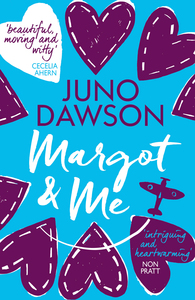Take a photo of a barcode or cover
This is one of those books that you have to read in one sitting. Impossible to put down, and highly emotional.
Full review to come.
EDIT 27/04/17:
DISCLAIMER: Changed my rating from 4 stars to 2 stars, because on reflection I couldn't see much deserving of merit. I got too excited about finishing it and reacted too quickly.
"Over time, we teach ourselves to stop feeling. It's the only way we survive." She taps her breastbone with her index finger. "It all becomes scar tissue and gristle. It's such a shame. So just let yourself feel it, truthfully and wholly, because one day you won't any more."
"But I don't want to feel like this. It really hurts." My voice crackles.
"It's better than nothing at all. Believe you me."
Fliss and her mum have gone to live in Wales with her grandmother, Margot, for six months, while Janet recovers from ovarian cancer. Fliss is unimpressed: she misses her friends and her sort-of-boyfriend Xander, and she's not a fan of the dirty farm or the aloof and unemotional Margot.
Things change when Fliss finds Margot's diary in a dusty old chest in the attic. Fliss loves sixteen-year-old Margot, and can't wait to see how her story got her to where she is today: she was in love with a man who wasn't Fliss's grandfather, and Fliss can't understand how their seemingly perfect relationship could have failed.
One thing severely hampered my enjoyment of this novel: it was riddled with errors. I always try to refrain from judging books too harshly for mistakes, but that's because I'm normally reading advance reader's copies and those aren't final. This one was.
I've left it a few days to write this review, because I felt very conflicted. I enjoyed the letters that told Margot's story, but Fliss didn't really have her own plot. Everything that happened to her was because of other people: she had a crush on the school librarian which she only got past when he rejected her; she only matured because of her mother's illness; her respect for Margot only developed because she discovered her diary. I can't think of one aspect of her character that she developed herself.
I was only interested in Margot's diary, and at multiple points I actually considered jumping to the next one. Fliss's reaction didn't add anything to the story for me, and it explains why this novel is so much longer than Juno's previous releases: there was lots of unnecessary waffle. If this story had just focused on Margot and being an evacuated teenager, it would have been five stars. Juno really brings the era to life, and the tense atmosphere of a country at war is beautifully crafted.
But as soon as it gets to the present plot, everything falls apart.
Read the rest of my review here!
Full review to come.
EDIT 27/04/17:
DISCLAIMER: Changed my rating from 4 stars to 2 stars, because on reflection I couldn't see much deserving of merit. I got too excited about finishing it and reacted too quickly.
"Over time, we teach ourselves to stop feeling. It's the only way we survive." She taps her breastbone with her index finger. "It all becomes scar tissue and gristle. It's such a shame. So just let yourself feel it, truthfully and wholly, because one day you won't any more."
"But I don't want to feel like this. It really hurts." My voice crackles.
"It's better than nothing at all. Believe you me."
Fliss and her mum have gone to live in Wales with her grandmother, Margot, for six months, while Janet recovers from ovarian cancer. Fliss is unimpressed: she misses her friends and her sort-of-boyfriend Xander, and she's not a fan of the dirty farm or the aloof and unemotional Margot.
Things change when Fliss finds Margot's diary in a dusty old chest in the attic. Fliss loves sixteen-year-old Margot, and can't wait to see how her story got her to where she is today: she was in love with a man who wasn't Fliss's grandfather, and Fliss can't understand how their seemingly perfect relationship could have failed.
One thing severely hampered my enjoyment of this novel: it was riddled with errors. I always try to refrain from judging books too harshly for mistakes, but that's because I'm normally reading advance reader's copies and those aren't final. This one was.
I've left it a few days to write this review, because I felt very conflicted. I enjoyed the letters that told Margot's story, but Fliss didn't really have her own plot. Everything that happened to her was because of other people: she had a crush on the school librarian which she only got past when he rejected her; she only matured because of her mother's illness; her respect for Margot only developed because she discovered her diary. I can't think of one aspect of her character that she developed herself.
I was only interested in Margot's diary, and at multiple points I actually considered jumping to the next one. Fliss's reaction didn't add anything to the story for me, and it explains why this novel is so much longer than Juno's previous releases: there was lots of unnecessary waffle. If this story had just focused on Margot and being an evacuated teenager, it would have been five stars. Juno really brings the era to life, and the tense atmosphere of a country at war is beautifully crafted.
But as soon as it gets to the present plot, everything falls apart.
Read the rest of my review here!
The story is centred on a girl called Felicity (Fliss for short) who is uprooted from her life in London and moved to a farm in Wales where her mother is suffering from cancer. The plan is to stay there temporarily until her mother recovers from the illness which would be much easier to deal with if Fliss didn’t have to put up with her horrid grandma called Margot. During Fliss’s exploration of her new home she comes across a diary that belonged to Margot during World War II and decides to start reading.
When I pick up a new book from an author I consistently read, I always look for improvements in the quality and writing. Juno Dawson does not disappoint. This book was just on a new level to anything she’s ever written and really did have a Hollow Pike feel to it. Unlike a lot of Young Adult books, Fliss really did feel like a teenager and a lot of the comments she made about things, including Margot, had me out-loud laughing at times. There was a really good balance between the past and present and it didn’t feel like you were lingering too long in the present world or the diary world. It was nice to see the barriers between Fliss and Margot slowly start to dismantle as the story progressed.
This book is a perfect example of how we may dismiss someone because they’re a polar opposite to us only to learn that actually we have a lot more in common than we originally thought.
When I pick up a new book from an author I consistently read, I always look for improvements in the quality and writing. Juno Dawson does not disappoint. This book was just on a new level to anything she’s ever written and really did have a Hollow Pike feel to it. Unlike a lot of Young Adult books, Fliss really did feel like a teenager and a lot of the comments she made about things, including Margot, had me out-loud laughing at times. There was a really good balance between the past and present and it didn’t feel like you were lingering too long in the present world or the diary world. It was nice to see the barriers between Fliss and Margot slowly start to dismantle as the story progressed.
This book is a perfect example of how we may dismiss someone because they’re a polar opposite to us only to learn that actually we have a lot more in common than we originally thought.
I liked the concept (granddaughter finding a diary and learning what her rather difficult grandmother was like at her age), but not the execution. Too many heavy handed parallels and token characters.

